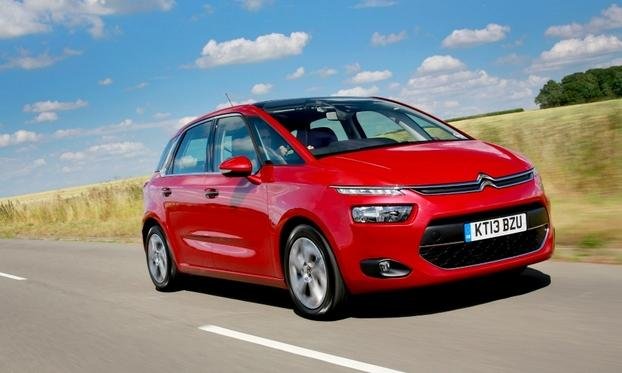Why French and Germans Still Believe in the Compact Minivan Sector

Volkswagen Group's Skoda is the latest automaker to abandon minivans to focus on SUVs and SUV-styled crossovers after ending production of its Roomster in December. The Czech marque joined its sister brand Seat, along with Fiat, Mazda and Honda, which have dropped minivans in Europe.
European compact minivan sales fell by 13 percent to 587,215 last year, according to JATO Dynamics market researchers. Sales of the models have dipped from almost 800,000 in 2011 and IHS Automotive forecasts that the segment will drop to below 400,000 by 2020.
IHS analyst Tim Urquhart said the trend toward customers switching to SUVs or SUV-styled crossovers will continue. "We can expect more cannibalization" of the European minivan market from SUVs going forward," Urquhart told Automotive News Europe.
The Roomster ranked 10th in the segment with sales of 22,248 in Europe last year. Skoda said strengthening its SUV range is now its priority. "The markets are now clearly showing the dynamic development of the SUV segment. By contrast, demand in the minivan segment has dropped," a Skoda spokeswoman said.
Skoda will unveil the VisionS concept for seven-seat SUV at the Geneva auto show in March.
Mazda sold its last Mazda5 in Europe late last year. A Mazda spokesman said the company has no midterm plans to replace the vehicle. Other automakers that have left the compact segment in recent years include Seat, which dropped the Altea, as well as Fiat, which axed the Multipla, and Honda, which stopped building the FR-V. Fiat now sells the 500L, which is the bestseller in Europe's small minivan segment.
Significant volume
But France's Renault and Citroen, along with Germany-based VW, Opel and Ford of Europe, still win significant volume from selling compact people-movers. The Citroen C4 Picasso/Grand Picasso led the segment in 2015 but its volume dropped along with the other segment leaders (see chart below).
French in the lead
The five best-selling mass-market compact minivans in Europe last year with unit sales and % change.
- Citroen C4 Picasso/Grand C4 Picasso 111,418 -6%
- Renault Scenic/Grand Scenic 105,171 -7%
- Ford C-Max/Grand C-Max 83,220 -8%
- VW Touran 73,663 -18%
- Opel Zafira 54,036 -35%
A key reason for the C4 Picasso's success is that it is the No. 2 selling compact minivan in Citroen’s home market of France, which is also Europe's strongest market for that type of vehicle. The minivan also ranked No. 1 in its segment in Spain and in the UK.
The C4 Picasso also has one of the highest profit margins of any model in the French automaker’s lineup, Citroen CEO Linda Jackson told Automotive News Europe. The minivan was Citroen’s second-biggest seller in Europe last year after the C3 subcompact hatchback.
The Renault Scenic/Grand Scenic, which ranked No. 2 in Europe, is the top-selling compact minivan in France, where vehicles from the segment account for one out of every 10 cars sold in the country, according to JATO figures.
Renault is expected to get a strong boost this year from the arrival of the new-generation Scenic, which will debut at the Geneva show. IHS predicts that the Scenic will rise to the top of the segment in 2017 with about 145,000 sales.
Sporty succeeds
The success of some new sporty minivan-like vehicles shows that people looking for a spacious compact-sized model can be lured away from SUVs and crossovers.
So far, VW has been the biggest winner here after selling 111,248 units of its Golf Sportsvan last year. That would have been good enough for second place in Europe's mass-market compact minivan segment, but Automotive News Europe puts the car, which is a high-roof variant of the Golf, in the compact hatchback sector.
The Golf Sportsvan replaced the awkward-looking, slow-selling Golf Plus in 2014. VW said during the launch that it gave the car a new name to emphasize that the Sportsvan and Golf Plus are different. The Sportsvan has a more dynamic design, a lower roofline and wider body.
Meanwhile, the Touran, VW's more conventional compact minivan, has just been replaced and is expected to top the segment this year, up from fourth place.
BMW, Mercedes success
BMW also is proving that the minivan segment is not dead with the success of its 2-series Active Tourer, which went on sale in Europe in 2014. The front-wheel-drive minivan was a bigger gamble than VW's Golf Sportsvan because BMW had said it would never build a minivan, and it was the first front-wheel-drive BMW in modern times.
Last year BMW had sold 84,309 units of the 2-series Active Tourer and its seven-seat sibling, the Gran Tourer, in Europe. That would have put the pair in third place ahead of the Ford C-Max/Grand C-Max if sales of minivans from premium brands were included in ANE's ranking. Mercedes-Benz sold 78,788 B-class minivans last year.
In some markets the premium offerings topped the compact minivan charts. For example, the 2-series was the segment leader in the Netherlands, Greece and Cyprus, while customers in Norway buy more B-class models than any other compact minivan. If the VW Sportsvan is removed from the competition, the B class becomes the most popular minivan in Germany, Europe's biggest compact minivan market by volume.
While some brands are exiting the segment, General Motors' Opel/Vauxhall unit is counting on cooperation with PSA/Peugeot-Citroen and crossover-like looks to boost sales of the replacement for the Zafira.
Opel CEO Karl-Thomas Neumann has said that the Zafira’s replacement, and also the next Meriva subcompact minivan, will both be styled as crossovers "because that's where customers are going." The new Zafira will be built at PSA’s plant in Sochaux, France, while the Meriva replacement will be produced at Opel’s factory in Zaragoza, Spain.
Nouvelles connexes


